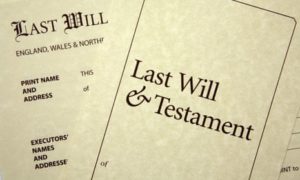Posted in Blog
Probate Lawyer
 When it comes to the probate process, there are many variables to consider when you are handling the will of a loved one, and it’s important to feel safe and secure as the executor of their will. If you are the executor of a will, it may be in your best interest to contact a probate lawyer in your area as they can help guide you with the estate through the probate court process. Sometimes a probate lawyer may not be needed if the assets are small and straight forward, but ultimately a lawyer is especially helpful if the assets are rather large or unusual. Working with a lawyer like the lawyers at W. B. Moore Law can ensure a more steady proceeding for the surrounding family and loved ones involved with the execution of a will. Below, You can review some various factors to consider in order to determine if it’s appropriate to hire a lawyer if you are an executor of a will.
When it comes to the probate process, there are many variables to consider when you are handling the will of a loved one, and it’s important to feel safe and secure as the executor of their will. If you are the executor of a will, it may be in your best interest to contact a probate lawyer in your area as they can help guide you with the estate through the probate court process. Sometimes a probate lawyer may not be needed if the assets are small and straight forward, but ultimately a lawyer is especially helpful if the assets are rather large or unusual. Working with a lawyer like the lawyers at W. B. Moore Law can ensure a more steady proceeding for the surrounding family and loved ones involved with the execution of a will. Below, You can review some various factors to consider in order to determine if it’s appropriate to hire a lawyer if you are an executor of a will.
Is There Enough Money Left In The Estate To Handle Any Remaining Debt?
During your initial investigation, if you find that the estate is able to pay off final expenses – such as funeral costs, bills from the latest illness, final income taxes – and there is enough money leftover to distribute to beneficiaries of the will, you shouldn’t need to figure out what remaining debts to pay. However if you find that the deceased person doesn’t enough money to cover leftover taxes and debt, you shouldn’t attempt to pay any bills until you’ve gotten legal advice on how to move forward.
Are Family Members And Loved Ones Cooperating?
Will contests aren’t very common, but they do happen. And these contests can become especially complicated if it’s over a large asset. If a beneficiary is threatening or initiating to sue over the estate, contact a lawyer immediately. These lawsuits can cause a lot of family strife and drain money from the estate, and you want to avoid this issue at all costs.
Can The Estate Qualify For Your State’s ‘Small Estate’ Process?
Each state is different when it comes to qualifying for a small estate process, and if you can qualify for this proceeding, it may be your best path forward where you also may not need a lawyer. Each state offers probate shortcuts if the estate is considered small enough. In other words, these shortcuts can mean a streamlined probate process or the ability to follow an out-of-court process by presenting a sworn statement to the institution holding the assets. Take the time to research your state’s options if you believe the assets are simple or small enough.
Does The Estate Have Complex Assets?
If the will only has common assets – such as a vehicle, house, bank accounts – then the distribution and handling of assets can be straightforward. However, if the estate includes a business or commercial real estate, it may lead to a more complicated process. You may want to seek legal and business advice to properly manage, distribute, or sell these assets and avoid conflict among beneficiaries.
